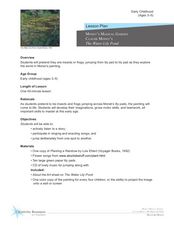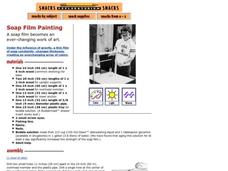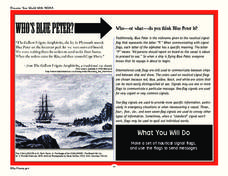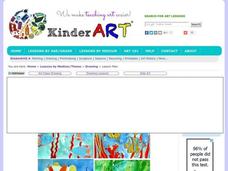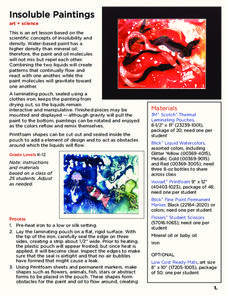Curated OER
Does The Type of Mulch Used Affect Plant Growth?
Students measure, record and graph the plants they grow in a controlled setting. They feed and water the plants as needed and use the scientific method to evaluate the growth.
Olomana School
Mixtures and Solutions: Paper Chromatography Experiment
Why does some ink bleed through paper, and other ink doesn't? Practice some paper chromatography to separate the colors from a pen with an interactive experiment for middle and high schoolers. Learners use a variety of solutions to track...
Ocean and Coastal Interdisciplinary Science
The Dark Ocean
Is the ocean blue at all depths? Nope! Explore the science behind the light spectrum in deep, dark waters. The activity recommends watching The Blue Planet: Open Ocean—The Deep, but it's not integral, or you can substitute another clip....
Curated OER
Picasso Portraits
Explore Pablo Picasso. For this art history and face drawing lesson plan, read a brief biography of Pablo Picasso. Draw a self portrait following guided instruction by the teacher. Paint a self-portrait and practice adding white...
Curated OER
Investigating The Mysteries Of Third Grade
Third graders use logic and knowledge of mathematics facts to solve problems. They see that pigments can be broken down into separate colors. Pupils recognize the capacity of water to move upward and measure the height water travels up...
Exploratorium
Penny Battery
Use pennies to light an LED. Class members follow the provided directions to build a multi-celled battery powered by pennies. Using stacks of pennies of varying heights, pupils control the voltage of the battery to light...
Exploratorium
Indicating Electrolysis
Sure, your learners know water is made up of two molecules, but watching them separate helps the class see the construction like never before. This resource provides directions on how to build a simple electrolysis device using a...
Nuffield Foundation
Investigating Transport Systems in a Flowering Plant
Some weddings have flowers in a unique, unnatural color to match the theme. Young scientists take part in this process to learn about the function of the xylem as they observe colored water moving through a flower. Then, they experiment...
Curated OER
Sky Observations Sky & Cloud Windows
Students observe the sky and weather to gather data. They conduct experiments to answer questions about the sky and weather phenomena. They measure, analyze and present data. They create sky windows by gluing sky colored paint chips...
It's About Time
Identifying Matter
High schoolers test wood splints that have been soaked in mystery solutions to identify the different colors it produces when lit. The lesson concludes with a reading passage and analysis questions.
Curated OER
Monet's Magical Garden
Students study classic paintings by masters like Monet. In this art history lesson, students listen to the story Planting a Rainbow by Lois Ehlert and sing flower songs with the rest of their class. Students examine the painting The...
Curated OER
Papier-Mâché Globe
Paper mache projects are great for using up paper from the recycle bin. Give your class the chance to create a three-dimensional globe out of paper mache. They'll work to make their globes as accurate as possible, adding proper colors...
Curated OER
Airbrushing on Silk
High schoolers create artwork by airbrushing on silk. This is a simple beginners project using five colors of paint and two types of stencils: positive and negative. As with all of the art lessons that come from this source, the products...
Exploratorium
Soap Film Painting
If you are up for constructing a wooden frame, you can do this demonstration of the interference patterns when light reflects off of layers of soapy film. Both constructive and destructive interference can be seen as evidenced by the...
NOAA
Who’s Blue Peter?
Scholars discover who Blue Peter is and how sailors used nautical signal flags on the open waters in order to create their own set of nautical signal flags and send messages to peers.
NOAA
Make an Edible Coral Reef
Coral reefs are full of an abundance of life and color. Why not celebrate it with an edible coral reef? Learners and teachers alike use cake, icing, and candies to create a tasty version of a coral reef that's complete with colors,...
Curated OER
Under the Sea
Tropical fish are a great subject for any art project, they are colorful, interesting, and can go along with under water themed stories read in class, learner written narratives, or Marine Biology units. This set of instructions will...
Curated OER
Insoluble Paintings
Use this art activity to study insolubility and density. Combining water-based paint and mineral oil will cause a fun and interactive painting. This is a great art project to incorporate during a science unit.
Curated OER
Emission Spectra
These attractive slides explain the basics of the electromagnetic spectrum and then display the emission spectra for a number of elements. argon, helium, hydrogen, xenon, neon and krypton are shown here and two graphs showing log scale...
Star Date
Modeling the Night Sky
Dramatize the stars and planets as they become a visual representation of the solar system in this activity. Young astronomers track and simulate various constellations as they orbit the Earth to learn the position and motion of...
NOAA
Wet Maps
How do oceanographers make maps under water? Junior explorers discover the technologies and processes involved in creating bathymetric maps in part three of a five-part series designed for fifth- and sixth-grade pupils. The lesson...
Curated OER
I See a Rainbow
Students identify the different colors in a rainbow. They experiment with dropping food coloring into a water and then making ice cubes. They discuss what happens to the water in the freezer
Curated OER
Tissue Collage with Oil Pastels
Students demonstrate how colors are mixed and how repetition, unity, and emphasis are used when creating a colorful collage.
Curated OER
Polar Bear Polar Bear
Students explore fictional literature. Students listen to a story about a polar bear who changes color. Students observe color models of the bear as the teacher reads. Students perform hand motions to parts of the story. They...












